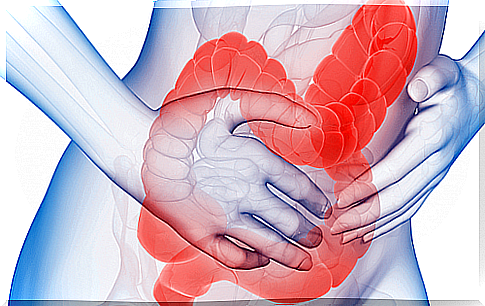Stress And Irritable Bowel Syndrome

There are more and more tests and clinical studies that tell us about the relationship between stress and irritable bowel syndrome. This gastrointestinal disorder affects nearly 10% of the population, mainly women. Improving the quality of life of these patients also includes providing them with psychological strategies with which to better manage their emotions.
It is not yet fully known how stress can alter our intestinal health. However, research such as that conducted at the State University of New York, in Albany, points to revealing data. Over 60% of people with anxiety disorders also suffer from irritable bowel syndrome. Scientists say this condition would actually be one more example of the complex biological interaction between the brain and gut.
This disease is also the most common digestive disorder, given the large number of people who go from specialist to specialist without finding an effective solution. Keeping the psychological factor in mind will certainly allow us to offer an additional therapeutic strategy, a new perspective which, together with the pharmacological or nutritional one, could give a more accurate response to patients.

Relationship between stress and irritable bowel syndrome
The relationship between stress and irritable bowel syndrome is increasingly shared and accepted within the medical community. There are those who argue that psychological factors intensify this digestive disorder, but that they do not determine its origin. Stress, therefore, would abnormally increase the movement and contractions of the gastrointestinal tract.
Other specialists, on the other hand, support the theory that emotional and psychological problems alter the immune system. The natural immunity of the organism would change until it provokes an inflammatory response in the gastric mucosa. All these organic changes are demonstrated by a very clear symptomatology, typical of irritable bowel syndrome. Let’s see what is the most common clinical picture of this condition:
- Abdominal colic. They can range from moderate to mild and last about two hours.
- Periods of constipation and diarrhea alternate.
- Continuous presence of intestinal gas.
- Rapid feeling of satiety; as soon as the subject ingests something, he feels full.
- Nausea, vomiting and a burning sensation in the chest.

What to do to relieve irritable bowel syndrome?
We know that there is a clear relationship between stress and irritable bowel syndrome. So, although we don’t have clear studies that tell us if stress affects its onset or if it just intensifies it, there are some factors whose influence is proven. The weight of genetics affects the appearance of this pathology. In other words, if our mother suffers from irritable bowel and we are women, the chances are that we will also suffer from it.
It is also clear that maintaining a certain eating style improves or worsens this condition. If in addition to following the medical precepts of specialists, we pay attention to sources of stress, we will enjoy a better quality of life. In fact, those suffering from irritable bowel syndrome face many social limitations and even absenteeism in the workplace. It is a disease that limits the quality of life, it is a silent pain that deserves greater visibility and sensitivity.

Precepts to improve irritable bowel syndrome
We need to start being aware of one aspect: the gut works as a kind of emotional barometer . Everything that worries us has an effect on the gastric mucosa. Stress or anxiety affects intestinal inflammation, motility and health.
- We need to start managing stress a little better. Clarify priorities, remember your needs, give yourself time, adopt adequate breathing and relaxation techniques, etc.
- Physical activity is another factor that will noticeably improve digestive health. In view of this clear relationship between stress and irritable bowel syndrome, we take into account the importance of practicing some physical activity. Even a simple walk every day can help us.
- Maintain a diet low in FODMAPs (simple sugars, dairy and wheat).
- Reduce your consumption of fat, caffeine, and processed foods.
- Stay well hydrated.
- Eat with peace of mind, preferably small quantities distributed over 5 meals a day.
- Consume prebiotic and probiotic foods.
In view of the fact that more and more people are suffering from irritable bowel syndrome, it is good to take this information into account. Before resorting to drugs, we always opt to improve our habits. Managing stress, setting rest times, eating a healthier diet or practicing relaxation techniques will help in these cases.









